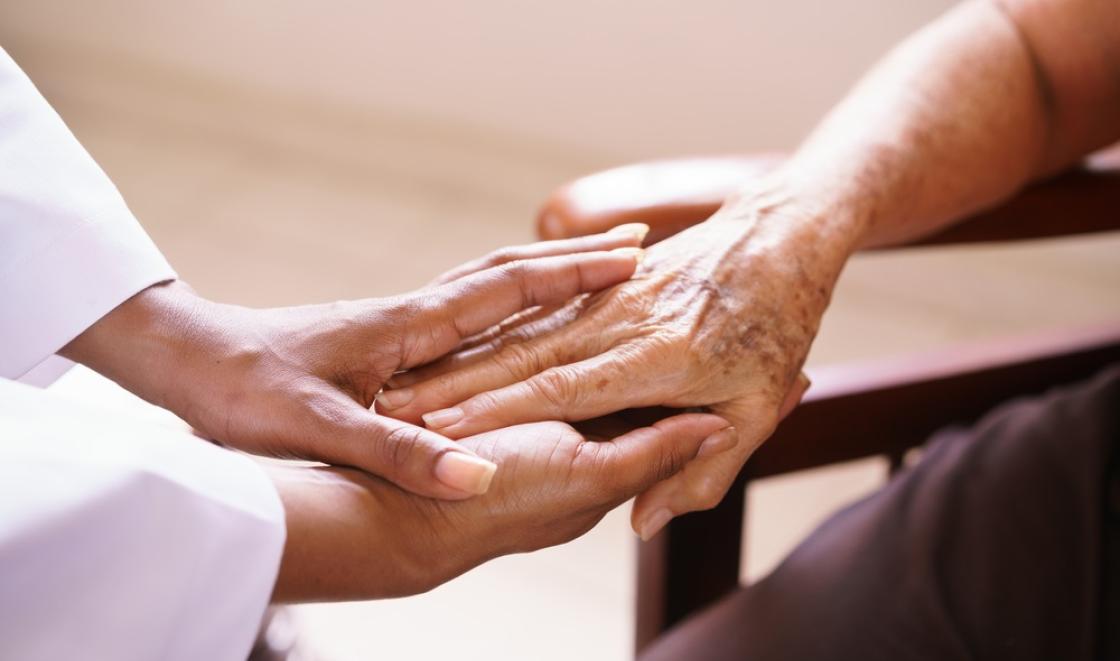The NIHR national forum is co-led by ARC South London’s Professor Irene Higginson, professor of palliative care and policy at King’s College London and ARC East of England’s Professor Morag Farquhar, professor of palliative care research at the University of East Anglia.
In this joint leadership role, the two ARCs have established a new forum that brings together specialist palliative care researchers and clinicians from across England.
Aims of the national forum
The national palliative and end of life care forum is designed to:
- Drive collaborative work across NIHR ARCs to maximise efficiency and impact for patients, public, health services and economic gain
- Foster collaboration with other NIHR parts and external partners incuding Academic Health Science Networks (AHSNs) local authorities, charities, industry and national health and care bodies
- Respond to Department for Health and Social Care and NIHR requests for expert advice
In particular, the national forum is looking to:
- Identify opportunities for national practice impact
- Enhance research dissemination and knowledge translation
- Catalyse large-scale implementation
- Address national questions requiring collaboration
Generating and implementing research evidence
The national forum has played a prime role in generating and implementing research evidence to improve palliative and end of life care. This includes advancing understanding of key challenges such as growing multimorbidity, variation in care quality, access and outcomes, new models of care, and the improvement and use of robust outcome measures to enhance service delivery, education and research.
The forum has also supported collaborative approaches to research, delivering capacity-building workshops and seminars. It continues to inform and respond to national priorities for palliative care research, with a growing focus on improving equity in care outcomes and addressing disparities across patient populations.
Launching a new webinar series
The NIHR ARC Palliative and End of Life Care National Leadership forum has launched a new webinar series featuring insights and discussions with leading experts.
Webinar 1: Recruitment in palliative and end of life care research
The first webinar took place on 7 October 2024, 11am-12pm, and focused on recruitment in palliative and end of life research. It was chaired by Prof Morag Farquhar and included presentations by Dr Amy Gadoud, senior lecturer in palliative medicine at Lancaster Medical School, Prof Andrew Davies, professor of palliative medicine at Trinity College Dublin and Melanie Waghorn, senior research nurse University College Dublin.
Watch a recording.
Webinar 2: Breathlessness in palliative and end of life care research
The second webinar took place on 2 December 2024, 11 -12pm and focused on breathlessness. It was chaired by Dr Amy Gadoud, senior lecturer in palliative medicine at Lancaster Medical School and the NIHR Integrated Clinical Academic Training Lead. It included presentations by Professor Irene Higginson, OBE, on Better Treatments for Refractory Breathlessness (the BETTER-B programme), Professor Matthew Maddocks on Breathlessness Support Services and Professor Morag Farquhar on the Learning about Breathlessness (LaB) study.
View the slides:
- Mirtazapine to alleviate severe breathlessness in patients with COPD or ILD (findings from Better-B), Professor Irene J Higginson
- What works and what doesn’t for non-pharmacological treatments for breathlessness, Professor Matthew Maddocks
- What unpaid/family carers need to learn about supporting someone with breathlessness – and a web-based resource to support them, Professor Morag Farquhar
More resources and information:
- Better-B website: Better Breathe
- Better-B patient and carer brief: BETTER-B Patient and Carer Brief.pdf
- Paper: Mirtazapine to alleviate severe breathlessness in patients with COPD or interstitial lung diseases (BETTER-B): an international, multicentre, double-blind, randomised, placebo-controlled, phase 3 mixed-method trial
- Paper: Practice review: Pharmacological management of severe chronic breathlessness in adults with advanced life-limiting diseases
- Paper: Optimising breathlessness triggered services for older people with advanced diseases: a multicentre economic study (OPTBreathe)
- Paper: Should opioids be used for breathlessness and in whom? A PRO and CON debate of the evidence
- Support: Supporting Someone with Breathlessness
- Support: Managing chronic breathlessness - e-learning for healthcare
- Support: Shortness of breath - NHS
- Resources: Managing breathlessness in advanced illness
Webinar 3: What can we learn from international research on assisted dying?
The third webinar took place on 4 February 2025 and focused on international research on assisted dying. The webinar came as UK parliamentarians are considering the practicalities of how the Bill on assisted dying for terminally ill people close to end of life should be implemented in England and Wales, if it becomes law. It was chaired by Professor Morag Farquhar, Professor of Palliative Care Research, University of East Anglia and included presentations from Professor Nancy Preston, a professor of palliative and end of life care, and Professor Suzanne Ost, a professor of law, from Lancaster University, highlighting the complexities involved and making recommendations for a possible model of assisted dying.
View slides and evidence presented to Parliament
- Presentation slides: Part 1 Professor Nancy Preston and Part 2 Professor Suzanne Ost
- Parliamentary committee presentation: Professor Preston spoke to Members of Parliament considering the Terminally Ill Adults (End of Life) Bill. Watch via Parliament TV from 14:01
- Written evidence: Professors Preston and Ost submitted written evidence to the committee, spelling out a list of key recommendations
Webinar 4: Building capacity in palliative and end of life research
The fourth webinar took place on Monday 14 April 2025 exploring the future of palliative care and highlighting the NIHR-supported Incubator, a new initiative to increase research capacity and drive improvements for patients, led by Professors Candy McCabe and Christina Faull. The webinar was chaired by Professor Irene Higginson, and included presentations by Professor Candy McCabe, Professor of Clinical Research and Practice, University of the West of England, Professor Christina Faull, a recently retired consultant in palliative medicine, and Kieran Potts, an academic clinician at North West Ambulance Service NHS Trust.
View the slides: Building capacity in palliative and end of life research
Webinar 5: The health and caregiving experiences of parents of children with a life-limiting condition.
The fifth webinar in the series took place on Tuesday 8 July 2025. It explored the health and caregiving experiences of parents of children with life-limiting conditions. It was chaired by Professor Morag Farquhar, University of East Anglia co-lead of the National NIHR ARC Leadership palliative and end of life care (PEoLC) and lead of the PEoLC theme for the ARC East of England. Speakers included: Julie Russell, an illustrator, teacher, and lived-experience advocate from Essex, Lorna Fraser, professor of palliative care and child health at King's College London and Dr Victoria Fisher, research associate at the Cicely Saunders Institute at King's College London.
View the slides: The health and caregiving experiences of parents with a life-limiting condition
Webinar 6: Timely access to end of life medication
This webinar took place on Tuesday 16 September 2025. It discussed the pressing issue of timely access to end-of-life medication. It opened with an introduction from Professor Morag Farquhar of the University of East Anglia, co-lead of the NIHR ARC Palliative and End of Life Care (PEoLC) National Leadership. It was chaired by Dr Ben Bowers, University of Cambridge. Speakers included: associate professor Sarah Yardley and senior research fellow Dr Sally-Anne Francis, UCL, Dr Rosanna Fennessy, University of Cambridge and Dr Ikumi Okamoto, University of Edinburgh.
View the slides: Timely access to end of life medication
Webinar 7: Access to palliative and end-of-life care for people with neurodegenerative conditions
This webinar took place on Wednesday 29 October 2025. It discussed the issue of palliative and end-of-life care for people with neurodegenerative conditions. It was opened by Professor Morag Farquhar of the University of East Anglia, co-lead of the NIHR ARC Palliative and End of Life Care (PEoLC) National Leadership.
The webinar was chaired by Emily Adams, stakeholder engagement and impact manager at DeNPRU Exeter. Speakers included: Jan Oyebode, professor of dementia care in Applied Dementia Studies at the University of Bradford and deputy director of DeNPRU Exeter, Karen Windle, professor of healthcare research and impact at the University of Ulster and a member of the Leadership Team at DeNPRU Exeter, Catherine Evans, interim director of Cicely Saunders Institute and clinical professor in Palliative Care, King’s College London and honorary nurse consultant, Sussex Community NHS Foundation Trust and Andy Bradshaw, a research fellow at the Cicely Saunders Institute, King’s College London.
More resources and information
- DeNPRU Exeter: Policy Research Unit in Dementia and Neurodegeneration (University of Exeter)
- Project: Parkinson’s disease: mapping the research and funding landscape and interim report
- Report: Living alone with dementia: a neglected inequality. DeNPRU Exeter report 2025
- Report: Living alone with a progressive neurological condition: a neglected inequality. DeNPRU Exeter report 2025
- Tool: SPICT (Supportive & Palliative Care Indicators Tool) helps us identify people with life shortening conditions for palliative care
- Tool: Dementia Palliative Care Service Toolkit
- EMPOWER Dementia Network+ is a dedicated network of people who want to work together to make things fair and equal for everyone with dementia
- Blog: Policy Lab reflections – building towards equity in dementia care together
- Dementia Network Plus
- Exhibition resources for family carers and practitioners: Dementia Journeys, an exhibition at Science Gallery London (April-June 2024)
Webinar 8: Developing inclusive practices around consent and mental capacity in palliative care research
This webinar took place on Tuesday 18 November 2025. The webinar was chaired by Professor Irene Higginson, ARC South London's palliative and end of life care research theme lead, King’s College London, and co-lead of the NIHR ARC Palliative and End of Life Care (PEoLC) National Leadership programme.
It opened with an introduction to the national context around inclusivity in research from Dr Katherine Jeays-Ward, research lead at NHS England. After this, Dr Caroline Barry, University of East Anglia, discussed a recent NHS England Research Engagement Network project to develop more inclusive practices around mental capacity and consent in palliative care research. Dr Victoria Shepherd, Cardiff University, then explored the ethical, legal, and practical challenges around research involving people with impaired capacity to consent.
View the slides
Our involvement in other collaborative research
Through the national ARC forum, ARC South London has initiated and participated in other national collaborative research projects. These include:
- Better End of Life Care, a research programme examining evidence on the current state of dying, death and bereavement across the UK, proposing a new policy agenda. This is a collaboration between ARCs South London and East of England and Hull-York University
- We are bringing together survey data from the original CovPall project (in CovPall-Connect) with routinely collected data from across the UK to deepen our understanding of how Covid-19 is impacting on palliative and end of life care teams
- An NIHR research programme investigating the influence of ethnicity in opioid prescribing in UK end of life care, a collaboration between ARCs South London and East of England
- An NIHR programme called ‘PrimaryBreathe’ designed to improve the management of chronic breathlessness in primary care, led by ARC East of England, with ARCs South London, East Midlands, Yorkshire and Humber.
Catalysing collaborative approaches
In addition to the collaborative approaches above, the national forum has provided new capacity building opportunities to improve palliative care research and practice in England. Examples include:
- training on public involvement in palliative care
- seminars on anticipatory prescribing and palliative care within care homes
- workshops on outcome measurement
- co-production workshops with public members
- seminars sharing learning from Covid-19 research (eg Online events explore latest research on role of palliative care in the Covid-19 response and implications for commissioning services).
Supporting areas where needs are greatest
Following an NIHR call for new research partnerships responding to areas of greatest need, we delivered a workshop in July 2021 to facilitate connections across stakeholders. Sixteen new partnerships were funded and launched in 2022, including three co-led by ARC South London:
- Palliative and end of life care in rural, coastal and low-income communities (with University of Exeter and ARC South West Peninsular)
- Integration between primary and palliative care (with University of Sheffield and ARC Yorkshire and Humber)
- Functional loss and rehabilitation towards the end of life (with University of Nottingham and ARC East Midlands).
The ambition of each palliative care partnership is to forge new collaborations including clinical, academic and lived-experience experts, who will develop research proposals to the NIHR.
Informing national priorities and work
Within the framework of the forum ARC South London has informed national research and policy priorities. This includes providing advice to:
- NHS England and Improvement (via the national clinical director for palliative and end of life care)
- Department of Health and Social Care (via the strategic adviser for palliative and end of life care)
- Care Quality Commission.
Our researchers have also been involved in the development of the Cicely Saunders International Action Plan, which recognises key challenges in UK's palliative care system and provides evidence-based solutions to tackle these, with engagement across sectors.
Generating evidence and supporting implementation in relation to Covid-19
In the early phase of the Covid-19 pandemic, ARC South London used the forum to lead national collaborative efforts to synthesise and generate evidence to support the Covid-19 response (through our CovPall and CovPall Care homes studies).
These collaborative research studies uncovered the impacts of Covid-19 on palliative service innovation and activity, care planning, the role of volunteers, care of dying, rehabilitation services, staff experiences and equity for ethnic minority groups. Key publications and outputs include:
- The first publication on palliative care in Covid-19 worldwide: a survey of 14 hospice services across Italy about initial responses to the pandemic
- A rapid national patient and public consultation to guide palliative care research response
- A rapid systematic review of the role and response of hospice and palliative care in epidemics/pandemics to inform Covid-19 response
- A case series of 101 patients with Covid-19 referred to hospital palliative care services
- A multi-centre study of symptom management and outcomes of patients needing palliative care
- Evidence-based resources to support breathlessness management at home during Covid-19, shared via GP Networks and European Lung Foundation.
A national effort
Our partners at ARC East of England also undertook a range of work to support the Covid-19 response, including:
- An online survey to investigate clinicians’ experiences concerning changes in anticipatory prescribing (AP) - the prescribing of injectable medications for community end of life care in advance of need - during the Covid-19 pandemic and their recommendations for change
- Research to understand bereavement and grief of family members and care providers (read this blog: A silent epidemic of grief)
In fact, across England, NIHR ARCs have initiated nearly 60 research projects aiming to better understand and address the impact of Covid-19 on end of life care. This research explores a range of issues, including:
- Evaluating different treatments
- 'Just in case' medicines
- Representations of bereavement and grief in the media
- Impact on staff mental health of providing end of life care during the pandemic
- Role of technology in maintaining communication between care home residents and family





